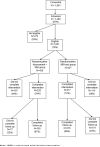An experimental test of assessment reactivity within a web-based brief alcohol intervention study for college students
- PMID: 26363306
- PMCID: PMC4644491
- DOI: 10.1016/j.addbeh.2015.08.011
An experimental test of assessment reactivity within a web-based brief alcohol intervention study for college students
Abstract
Objective: Web-based brief alcohol intervention (WBI) programs have efficacy in a wide range of college students and have been widely disseminated to universities to address heavy alcohol use. In the majority of efficacy studies, web-based research assessments were conducted before the intervention. Web-based research assessments may elicit reactivity, which could inflate estimates of WBI efficacy. The current study tested whether web-based research assessments conducted in combination with a WBI had additive effects on alcohol use outcomes, compared to a WBI only.
Methods: Undergraduate students (n=856) from universities in the United States and Canada participated in this online study. Eligible individuals were randomized to complete 1) research assessments+WBI or 2) WBI-only. Alcohol consumption, alcohol-related problems, and protective behaviors were assessed at one-month follow up.
Results: Multiple regression using 20 multiply imputed datasets indicated that there were no significant differences at follow up in alcohol use, alcohol-related problems, or protective behaviors used when controlling for variables with theoretical and statistical relevance. A repeated measures analysis of covariance revealed a significant decrease in peak estimated blood alcohol concentration in both groups, but no differential effects by randomized group. There were no significant moderating effects from gender, hazardous alcohol use, or motivation to change drinking.
Conclusions: Web-based research assessments combined with a web-based alcohol intervention did not inflate estimates of intervention efficacy when measured within-subjects. Our findings suggest universities may be observing intervention effects similar to those cited in efficacy studies, although effectiveness trials are needed.
Keywords: Alcohol; Assessment reactivity; College students; Methodology; Web-based intervention.
Copyright © 2015 Elsevier Ltd. All rights reserved.
Figures
Similar articles
-
Effects of a stand-alone web-based electronic screening and brief intervention targeting alcohol use in university students of legal drinking age: A randomized controlled trial.Addict Behav. 2018 Feb;77:81-88. doi: 10.1016/j.addbeh.2017.09.017. Epub 2017 Sep 28. Addict Behav. 2018. PMID: 28985586 Clinical Trial.
-
Effectiveness of a web-based brief alcohol intervention and added value of normative feedback in reducing underage drinking: a randomized controlled trial.J Med Internet Res. 2010 Dec 19;12(5):e65. doi: 10.2196/jmir.1465. J Med Internet Res. 2010. PMID: 21169172 Free PMC article. Clinical Trial.
-
Randomized controlled trial of proactive web-based alcohol screening and brief intervention for university students.Arch Intern Med. 2009 Sep 14;169(16):1508-14. doi: 10.1001/archinternmed.2009.249. Arch Intern Med. 2009. PMID: 19752409 Clinical Trial.
-
The effectiveness of intervention studies to decrease alcohol use in college undergraduate students: an integrative analysis.Worldviews Evid Based Nurs. 2004;1(2):102-19. doi: 10.1111/j.1741-6787.2004.04028.x. Worldviews Evid Based Nurs. 2004. PMID: 17129324 Review.
-
Alcohol interventions for mandated college students: A meta-analytic review.J Consult Clin Psychol. 2016 Jul;84(7):619-32. doi: 10.1037/a0040275. Epub 2016 Apr 21. J Consult Clin Psychol. 2016. PMID: 27100126 Free PMC article. Review.
Cited by
-
Examining Emailed Feedback as Boosters After a College Drinking Intervention Among Fraternities and Sororities: Rationale and Protocol for a Remote Controlled Trial (Project Greek).JMIR Res Protoc. 2022 Oct 28;11(10):e42535. doi: 10.2196/42535. JMIR Res Protoc. 2022. PMID: 36306162 Free PMC article.
-
Repeated Assessment of Alcohol Use and Perceived Norms Among College Students Who Drink: Comparisons to a Minimal Assessment at 12-Month Follow-Up.J Stud Alcohol Drugs. 2022 Jul;83(4):588-595. doi: 10.15288/jsad.2022.83.588. J Stud Alcohol Drugs. 2022. PMID: 35838437 Free PMC article. Clinical Trial.
-
Emotion Regulation Enhancement of Cognitive Behavior Therapy for College Student Problem Drinkers: A Pilot Randomized Controlled Trial.J Child Adolesc Subst Abuse. 2018;27(1):47-58. doi: 10.1080/1067828X.2017.1400484. Epub 2017 Dec 8. J Child Adolesc Subst Abuse. 2018. PMID: 30930609 Free PMC article.
-
Evaluating Personalized Feedback Intervention Framing with a Randomized Controlled Trial to Reduce Young Adult Alcohol-Related Sexual Risk Taking.Prev Sci. 2019 Apr;20(3):310-320. doi: 10.1007/s11121-018-0879-4. Prev Sci. 2019. PMID: 29511966 Free PMC article. Clinical Trial.
-
Randomized Study of Assessment Effects on Alcohol Use by Persons With HIV in Rural Uganda.J Stud Alcohol Drugs. 2017 Mar;78(2):296-305. doi: 10.15288/jsad.2017.78.296. J Stud Alcohol Drugs. 2017. PMID: 28317511 Free PMC article. Clinical Trial.
References
-
- Babor TF, de la Fuente JR, Saunders J, Grant M. Guidelines for use in primary health care. World Health Organization; 1992. The Alcohol Use Disorders Identification Test.
-
- Bersamin M, Paschall MJ, Fearnow-Kenney M, Wyrick D. Effectiveness of a Web-based alcohol-misuse and harm-prevention course among high- and low-risk students. Journal of American College Health: J of ACH. 2007;55(4):247–254. http://doi.org/10.3200/JACH.55.4.247-254. - DOI - PubMed
-
- Bertholet N, Gaume J, Faouzi M, Gmel G, Daeppen J-B. Predictive value of readiness, importance, and confidence in ability to change drinking and smoking. BMC Public Health. 2012;12:708. http://doi.org/10.1186/1471-2458-12-708. - DOI - PMC - PubMed
-
- Borsari B, Carey KB. Effects of a Brief Motivational Intervention with College Student Drinkers. Journal of Consulting and Clinical Psychology. 2000;68(4):728–733. http://doi.org/10.1037/0022-006X.68.4.728. - DOI - PubMed
Publication types
MeSH terms
Grants and funding
LinkOut - more resources
Full Text Sources
Other Literature Sources
Medical



